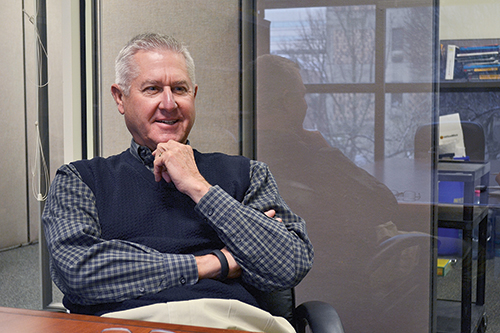Portland State’s Center for Real Estate has a new executive director who wants you to experience his love for the world of real estate. On Jan. 1, Larry Remmers, a former senior vice president for Wells Fargo Bank, began his new position at PSU after more than 30 years in banking and 25 years in real estate lending.
Former senior VP takes reins at PSU’s Center for Real Estate

Portland State’s Center for Real Estate has a new executive director who wants you to experience his love for the world of real estate.
On Jan. 1, Larry Remmers, a former senior vice president for Wells Fargo Bank, began his new position at PSU after more than 30 years in banking and 25 years in real estate lending.
“I love real estate,” Remmers said, “and you can underline ‘love.’” After only a few weeks, Remmers has already harnessed his passion to establish his priorities as well as how best to achieve the goals of the center.
“We are student-centric,” he said. “Our primary product is students.”
With the center’s continual growth and the recent addition of a master’s program, there is more need than ever to focus attention on students.
The center was created in 2004 and brings together the School of Business Administration and the Toulan School of Urban Studies and Planning with the goal of better preparing students for a career in real estate through more focused academic programs, internship experience and connections to industry leaders.
Thanks to a board with more than 30 members from the real estate industry, representing both public and private industry, professors and administration are always updated and aware of what today’s industry looks for in a graduate, Remmers said.
PSU President Wim Wiewel said that the center plays a valuable role on
campus.
“We are very fortunate to have a Center for Real Estate, as a joint effort between the School of Business Administration and the College of Urban and Public Affairs, so that both private and public aspects of real estate development can be studied and taught,” Wiewel said in an email.
In order to continue the growth of the Center for Real Estate, Remmers acknowledged the first priority is attracting more students, which the center plans to do through better branding.
Rather than spending loads of money creating the perfect symbol or designing the ideal website, drumming up interest is about the reputation the center has created for itself, Remmers said: “Brands are earned, not made.”
By meeting with the first set of master’s students and considering their feedback and suggestions, Remmers hopes to enhance the center’s programs. He believes that by bettering the experience for students now, they will create the brand the Center for Real Estate seeks.
“Ultimately, brand is a function of student success,” he explained.
Remmers noted that getting to know students leads to better placement in internships and employment opportunities, leading to a better overall experience.
Another huge priority for Remmers this year is raising money.
“The goal of the center is to be self-supporting, with predictable financial support,” he said.
In order to establish stable funding, Remmers explained, the best solution is to find a benefactor willing to make a large contribution.
While finding someone with enough money and interest to do that is a daunting task, Specht Development CEO and Center for Real Estate Advisory Board member Greg Specht says Remmers is the perfect person to be at the center’s helm right now.
After noting that Dr. Gerry Mildner, also a Center for Real Estate board member, was responsible for the center’s initial growth and exposure, Specht explained that because Remmers has no academic responsibilities, “he is the right guy in the right place at the right time to really take this program to the next level.”
Center for Real Estate Assistant Director Julie Gibson, who has known Remmers since 2006, believes Remmers has “great connections within the industry that will expand the levels of support.”
Having originally graduated with a degree in history, Remmers admitted part of his adoration for the industry is getting to know a site or building’s history, whether it is obvious or not.
He also noted that life in the real estate industry is intellectually challenging as well as full of risk.
“To become excellent in real estate you need to understand the constant nuances,”
he said.
Of all the reasons to love real estate, however, Remmers pointed out that the most appealing aspect is the incredible diversity of career positions.
“There are so many different avenues you can take in real estate. So much is interrelated. You may find yourself leaving one field to enter another.”






